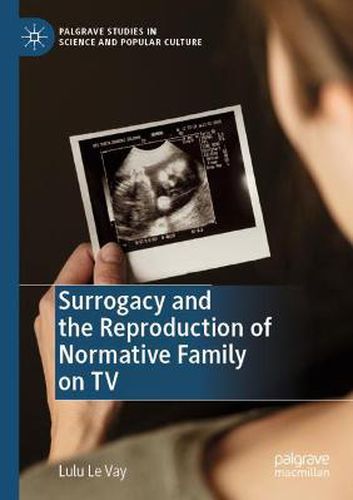Readings Newsletter
Become a Readings Member to make your shopping experience even easier.
Sign in or sign up for free!
You’re not far away from qualifying for FREE standard shipping within Australia
You’ve qualified for FREE standard shipping within Australia
The cart is loading…






This title is printed to order. This book may have been self-published. If so, we cannot guarantee the quality of the content. In the main most books will have gone through the editing process however some may not. We therefore suggest that you be aware of this before ordering this book. If in doubt check either the author or publisher’s details as we are unable to accept any returns unless they are faulty. Please contact us if you have any questions.
This book examines the proliferation of surrogacy storylines on TV, exploring themes of infertility, motherhood, parenting and family. It investigates how, despite reproductive technologies’ ability to flex contours of family, the shows’ narratives work to uphold the white, heterosexual, genetically-reproduced family as the ideal. In dialogue with responses from a range of female viewers, both mothers and non-mothers, the book scrutinises the construction of family ideology on television with studies including Coronation Street (1960-present), Giuliana & Bill (2009-2014), Rules of Engagement (2007-2013), The New Normal (2012-2013), Top of the Lake: China Girl (2017) The Handmaid’s Tale (2017-present) and film Baby Mama (2008). These studies raise a number of questions; is homosexuality only acceptable when it echoes heterosexual norms? Are female characters only fulfilled when they are genetic mothers? Does heterosexual romance override technology in the cure for infertility? While the answers to these questions may suggest that television still conforms to heteronormative narratives, this book importantly demonstrates that audiences desire alternative happy endings that show infertile female characters more positively and recognise alternative kinship formations as meaningful.
$9.00 standard shipping within Australia
FREE standard shipping within Australia for orders over $100.00
Express & International shipping calculated at checkout
This title is printed to order. This book may have been self-published. If so, we cannot guarantee the quality of the content. In the main most books will have gone through the editing process however some may not. We therefore suggest that you be aware of this before ordering this book. If in doubt check either the author or publisher’s details as we are unable to accept any returns unless they are faulty. Please contact us if you have any questions.
This book examines the proliferation of surrogacy storylines on TV, exploring themes of infertility, motherhood, parenting and family. It investigates how, despite reproductive technologies’ ability to flex contours of family, the shows’ narratives work to uphold the white, heterosexual, genetically-reproduced family as the ideal. In dialogue with responses from a range of female viewers, both mothers and non-mothers, the book scrutinises the construction of family ideology on television with studies including Coronation Street (1960-present), Giuliana & Bill (2009-2014), Rules of Engagement (2007-2013), The New Normal (2012-2013), Top of the Lake: China Girl (2017) The Handmaid’s Tale (2017-present) and film Baby Mama (2008). These studies raise a number of questions; is homosexuality only acceptable when it echoes heterosexual norms? Are female characters only fulfilled when they are genetic mothers? Does heterosexual romance override technology in the cure for infertility? While the answers to these questions may suggest that television still conforms to heteronormative narratives, this book importantly demonstrates that audiences desire alternative happy endings that show infertile female characters more positively and recognise alternative kinship formations as meaningful.